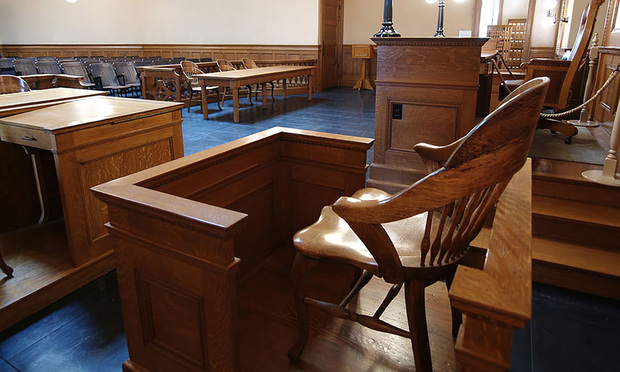En Banc Rehearing Doesn't Change Outcome of First-Impression Attorney-Client Privilege Case
A litigant who asserts attorney-client privilege before trial may not unfairly surprise their adversary by waiving that privilege on the stand, a deeply split Pennsylvania Superior Court en banc has ruled, reaching the same conclusion arrived at by a divided three-judge panel in 2016.
September 27, 2018 at 03:37 PM
6 minute read
 Credit: BigStock
Credit: BigStock
A litigant who asserts attorney-client privilege before trial may not unfairly surprise their adversary by waiving that privilege on the stand, a deeply split Pennsylvania Superior Court en banc has ruled, reaching the same conclusion arrived at by a divided three-judge panel in 2016.
In December 2016, the original panel, addressing an issue of first impression, ruled 2-1 in Gregury v. Greguras that a defendant who asserted her attorney-client privilege during the discovery phase in a dispute over a will should not have been allowed to waive that privilege once the case got to trial.
The court granted rehearing en banc in January 2017 and on Sept. 20 of this year issued its decision, voting 5-4 to reverse a decision from the York County Court of Common Pleas, which had denied a motion by the plaintiffs seeking either a mistrial or an extension of the discovery period after the defendant announced at trial she would be waiving the privilege.
“An eleventh-hour waiver has considerable potential to create unfair surprise and prejudice to the other party, and it is the role of the trial court to prevent it by reasonable means,” Judge Mary Jane Bowes wrote for the majority.
The case stems from a dispute between plaintiffs John Gregury and Barbara Robey, the children of decedent Adolf Greguras, who was married to Shirley Greguras. Shirley Greguras had worked with attorney James Yingst of Guthrie, Nonemaker, Yingst & Hart to prepare a will for Adolf Greguras. The plaintiffs contended that Shirley Greguras and Yingst “committed some sort of fraud or breach of duty” that prevented them from accessing assets they believed Adolf Greguras intended to leave for them.
The case proceeded to trial on claims including fraud and intentional infliction of emotional distress. According to court documents, after the defendants' opening statement, defense counsel indicated that Shirley Greguras intended to waive her attorney-client privilege at trial.
The plaintiffs made a motion for mistrial or a delay to allow for additional discovery, but the trial court denied the motion, saying, “The privilege was [Shirley Greguras'] to invoke or waive at trial.”
At the end of the plaintiffs' case the trial court granted a motion to dismiss the suit.
On appeal, the plaintiffs contended the late waiver of privilege made cross-examination extremely problematic, and would allow her to “concoct any claim of previously undisclosed privileged discussions, free of any risk of rebuttal.”
The court en banc sought guidance based on how Pennsylvania courts have dealt with similar privilege issues, such as the last-minute waiver of a previously invoked Fifth Amendment privilege in a civil case and the last-minute waiver of the physician-patient privilege in a medical malpractice case.
“Although the propriety of a voluntary last-minute waiver of the previously invoked attorney-client privilege appears to be a question of first impression in this commonwealth, our courts have taken a dim view of the manipulation of privilege in other circumstances,” Bowes said.
And as the original three-judge panel had done, the court en banc also looked at how other courts have addressed the last-minute waiver of attorney-client privilege.
Bowes noted that the Washington State Court of Appeals and a federal district court in Florida both prohibited the tactic.
“Herein, the trial court failed to appreciate the prejudice to appellants from Shirley's last-minute waiver of the privilege,” Bowes said. “If it had, we believe it could have alleviated the prejudice without declaring a mistrial. The trial court could have precluded appellees from introducing at trial the communications that were the subject of the earlier exercise of the privilege, or alternatively, briefly halted the proceedings to permit limited discovery of Shirley and attorney Yingst. The trial court's failure to acknowledge the unfair surprise and remedy its prejudicial impact upon appellants' trial strategy, their ability to effectively cross-examine appellees, and the testimony of appellants' expert, requires a new trial.”
Bowes was joined by Judges John Bender, Jacqueline Shogan, Judith Ference Olson and Victor Stabile.
Judge Paula Francisco Ott penned a dissenting opinion, joined by President Judge Susan Peikes Gantman and Judges Anne Lazarus and Alice Dubow.
“While the majority provides a thoughtful analysis of at-trial waiver of the attorney-client privilege, I believe the trial court did not abuse its discretion in denying the motion for mistrial in light of 42 Pa.C.S. Section 5928, which permits the privilege to be waived 'upon the trial by the client,' and the circumstances of this case,” Ott said.
Ott argued that “it was reasonable that [Shirley Greguras] would waive her privilege, if at all, only when appellants' counsel argued to the jury in his opening statement that appellees 'exercised attorney/client privilege inconsistently in their depositions' and the jury 'could consider that in assessing [appellees'] credibility.'”
“Under these circumstances, counsel's own trial strategy cannot create 'unfair surprise,'” Ott said.
Ott further contended that counsel for Gregury and Robey should have anticipated that Shirley Greguras might waive her privilege at trial.
“Given appellants' counsel's belief there were 'irregular' assertions of the privilege in discovery and his trial strategy to attack appellees' credibility, and in light of Section 5928 that allows waiver of the privilege 'upon the trial,' appellants' counsel had every reason prior to trial to file a motion in limine to preclude Shirley's waiver of the attorney-client privilege at the time of trial,” Ott said. “He did not do so.”
Andrew W. Barbin, who represented the plaintiffs, said in a statement: “Pending further action by our Supreme Court, if any, plaintiffs will receive all they ever wanted, an opportunity for their claims to be heard by a jury of their peers to determine justice and provide closure.”
Edwin Schwartz of Marshall Dennehey Warner Coleman & Goggin, who represented Yingst, did not return a call for comment.
(Copies of the 48-page opinion in Gregury v. Greguras, PICS No. 18-1185, are available at http://at.law.com/PICS.)
This content has been archived. It is available through our partners, LexisNexis® and Bloomberg Law.
To view this content, please continue to their sites.
Not a Lexis Subscriber?
Subscribe Now
Not a Bloomberg Law Subscriber?
Subscribe Now
NOT FOR REPRINT
© 2025 ALM Global, LLC, All Rights Reserved. Request academic re-use from www.copyright.com. All other uses, submit a request to [email protected]. For more information visit Asset & Logo Licensing.
You Might Like
View All


Feasting, Pledging, and Wagering, Philly Attorneys Prepare for Super Bowl
3 minute read
TikTok Opts Not to Take Section 230 Immunity Fight to U.S. Supreme Court
4 minute readTrending Stories
- 1States Accuse Trump of Thwarting Court's Funding Restoration Order
- 2Microsoft Becomes Latest Tech Company to Face Claims of Stealing Marketing Commissions From Influencers
- 3Coral Gables Attorney Busted for Stalking Lawyer
- 4Trump's DOJ Delays Releasing Jan. 6 FBI Agents List Under Consent Order
- 5Securities Report Says That 2024 Settlements Passed a Total of $5.2B
Who Got The Work
J. Brugh Lower of Gibbons has entered an appearance for industrial equipment supplier Devco Corporation in a pending trademark infringement lawsuit. The suit, accusing the defendant of selling knock-off Graco products, was filed Dec. 18 in New Jersey District Court by Rivkin Radler on behalf of Graco Inc. and Graco Minnesota. The case, assigned to U.S. District Judge Zahid N. Quraishi, is 3:24-cv-11294, Graco Inc. et al v. Devco Corporation.
Who Got The Work
Rebecca Maller-Stein and Kent A. Yalowitz of Arnold & Porter Kaye Scholer have entered their appearances for Hanaco Venture Capital and its executives, Lior Prosor and David Frankel, in a pending securities lawsuit. The action, filed on Dec. 24 in New York Southern District Court by Zell, Aron & Co. on behalf of Goldeneye Advisors, accuses the defendants of negligently and fraudulently managing the plaintiff's $1 million investment. The case, assigned to U.S. District Judge Vernon S. Broderick, is 1:24-cv-09918, Goldeneye Advisors, LLC v. Hanaco Venture Capital, Ltd. et al.
Who Got The Work
Attorneys from A&O Shearman has stepped in as defense counsel for Toronto-Dominion Bank and other defendants in a pending securities class action. The suit, filed Dec. 11 in New York Southern District Court by Bleichmar Fonti & Auld, accuses the defendants of concealing the bank's 'pervasive' deficiencies in regards to its compliance with the Bank Secrecy Act and the quality of its anti-money laundering controls. The case, assigned to U.S. District Judge Arun Subramanian, is 1:24-cv-09445, Gonzalez v. The Toronto-Dominion Bank et al.
Who Got The Work
Crown Castle International, a Pennsylvania company providing shared communications infrastructure, has turned to Luke D. Wolf of Gordon Rees Scully Mansukhani to fend off a pending breach-of-contract lawsuit. The court action, filed Nov. 25 in Michigan Eastern District Court by Hooper Hathaway PC on behalf of The Town Residences LLC, accuses Crown Castle of failing to transfer approximately $30,000 in utility payments from T-Mobile in breach of a roof-top lease and assignment agreement. The case, assigned to U.S. District Judge Susan K. Declercq, is 2:24-cv-13131, The Town Residences LLC v. T-Mobile US, Inc. et al.
Who Got The Work
Wilfred P. Coronato and Daniel M. Schwartz of McCarter & English have stepped in as defense counsel to Electrolux Home Products Inc. in a pending product liability lawsuit. The court action, filed Nov. 26 in New York Eastern District Court by Poulos Lopiccolo PC and Nagel Rice LLP on behalf of David Stern, alleges that the defendant's refrigerators’ drawers and shelving repeatedly break and fall apart within months after purchase. The case, assigned to U.S. District Judge Joan M. Azrack, is 2:24-cv-08204, Stern v. Electrolux Home Products, Inc.
Featured Firms
Law Offices of Gary Martin Hays & Associates, P.C.
(470) 294-1674
Law Offices of Mark E. Salomone
(857) 444-6468
Smith & Hassler
(713) 739-1250





